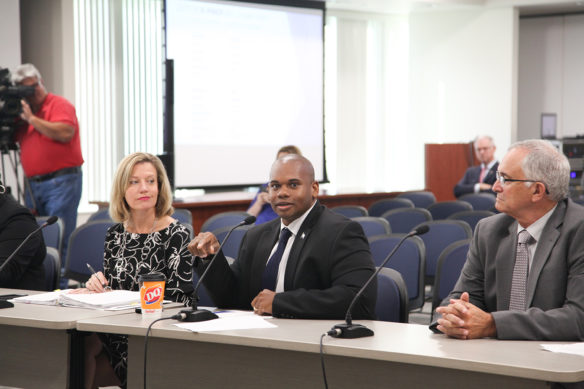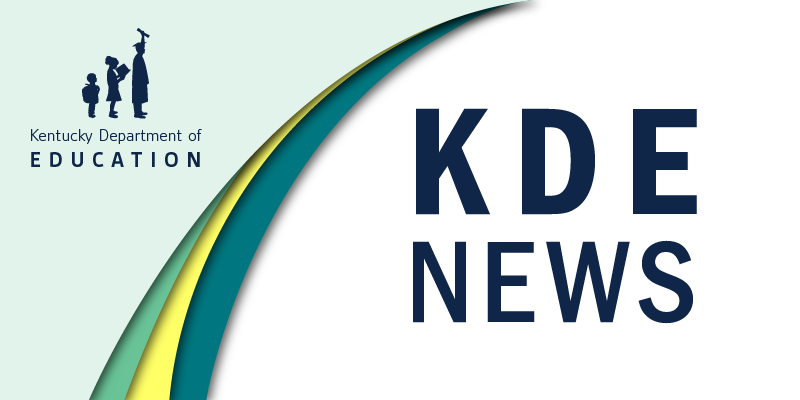
Education Commissioner Wayne Lewis, center, speaks to the Kentucky Board of Education Oct. 3 about the importance of making high school diplomas mean more in the Commonwealth. At the meeting, the board unanimously approved an amendment to Kentucky’s minimum high school graduation requirements. With Lewis are, from left, Associate Commissioners Amanda Ellis and David Horseman.
Photo by Megan Gross, Oct. 3, 2018
(FRANKFORT, Ky.) – The Kentucky Board of Education (KBE) voted unanimously Oct. 3 to approve a proposal that will change minimum high school graduation requirements for students who will graduate in the Classes of 2023 and 2024. The requirements will be subject to a 30-day public comment period, likely to begin on Nov. 1.
“Oct. 3, 2018, should be remembered as a day which will change the trajectory for Kentucky’s students,” said Kentucky Board of Education Chairman Hal Heiner. “Through these requirements we are setting a bar for students that will ensure that all Kentucky public high school graduates will be ready for college or a career immediately upon graduation.”
Kentucky Education Commissioner Wayne Lewis spoke to the board preceding the vote about the challenges facing students in today’s classrooms, providing data from K-PREP, NAEP, and ACT test scores. In 2018, he said, 63 percent of 8th-grade students were scored Proficient or higher in reading, and 46 percent in math. The 2017 NAEP scores showed 25 percent of 8th-graders scoring below basic in reading, and 35 percent in math. The scores for individual student groups, particularly low-income and African American students, were much lower. Nonetheless, Kentucky boasts one of the highest high school graduation rates in the country – awarding 93 percent of its 12th-grade students a high school diploma.
“We have to do something different,” said Lewis. “If we cannot ensure that students do not have basic foundational skills in mathematics, the jobs that require those skills in our economy will be closed to them.”
Lewis also cited data from the Kentucky Center for Statistics that shows that of the 37,217 students who graduated in the Class of 2010, only 6,851 completed a 4-year degree over a 7-year period and are earning an average annual wage of $33,793.
“Rather than celebrate our high school graduation rate, we should hang our heads in shame that what we’ve given to many students is a certificate of attendance.”
The proposed minimum high school graduation requirements are aligned to the “profile of a graduate” described by post-secondary educators and business and industry leaders that say that high school graduates should be able to clearly communicate, achieve academically, critically think, adapt to change and collaborate.
In order to develop these skills, under the proposed requirements a graduate would complete a minimum of 22 credits and demonstrate foundational skills in reading and mathematics on high school assessments. These assessments can be taken more than once and appeals could be made to a local superintendent if necessary.
Additional requirements include:
- completing the state science and social studies assessments
- passing a state-mandated civics test
- receiving instruction in financial literacy
- demonstrating essential skills and technology
The requirements are divided into three components: foundational, personalized, and transition-ready.
Under the foundational and personalized components students must successfully complete:
- English I and II AND 2 additional English language arts credits aligned with the student’s Individual Learning Plan (ILP)
- Algebra I and Geometry AND two additional mathematics credits aligned with the student’s ILP
- 3 credits social studies (at least 1 aligned with the student’s ILP)
- 3 credits science (at least 1 aligned with the student’s ILP)
- 1/2 credit health
- 1/2 credit physical education
- 1 credit visual and performing arts
- 6 additional credits aligned with the student’s ILP
Students must be able to demonstrate that they are transition ready through academic readiness by:
- Scoring at or above the benchmark score as determined by the Council on Postsecondary Education (CPE) on the college admissions examination; or
- Completing 6 or more hours of KDE-approved dual credit courses and receiving a grade of B or higher in each course; or
- Completing 2 or more Advanced Placement (AP) courses and receiving a score of 3 or higher on each AP assessment; or
- Receiving a score of 5 or higher on 2 examinations for International Baccalaureate (IB) courses; or
- Scoring at or above the benchmark on 2 or more Cambridge Advanced examinations; or
- Completing a combination of academic readiness indicators listed above.
Or, students could demonstrate that they are transition ready through career readiness by:
- Scoring at or above the benchmark on industry certifications as approved by the Kentucky Workforce Innovation Board (KWIB) on an annual basis; or
- Scoring at or above the benchmark on Career and Technical Education (CTE) end-of-program assessments for articulated credit; or
- Completing 6 or more hours of KDE approved CTE dual credit courses, and receiving a grade of B or higher in each course; or
- Completing a KDE-approved or Labor Cabinet-approved apprenticeship; or
- Completing a KDE-approved alternate process to verify exceptional work experience.
The Kentucky Department of Education will accept public comments on the regulation through Nov. 30. Written comments on the proposed amendment to 704 KAR 3:305 may be sent to Deanna Durrett, General Counsel, Kentucky Department of Education, 300 Sower Boulevard, 5th Floor, Frankfort, KY 40601, or emailed to regcomments@education.ky.gov.
The board will review and consider any public comments submitted during the 30-day comment period at an upcoming meeting this fall, and the requirements will then move to the Kentucky General Assembly legislative committee for final approval.
OTHER BUSINESS
In other business during its meetings Oct. 2 and 3, the Kentucky Board of Education approved new or revised standards for reading and writing, mathematics, health, physical education and computer science.

Associate Commissioners Amanda Ellis speaks with with members of the Curriculum, Instruction and Assessment Committee of the Kentucky Board of Education about changes to Kentucky Academic Standards at its meeting Oct. 2. The full board approved new or revised standards in computer science, reading and writing, health, mathematics and physical education.
Photo by Megan Gross, Oct. 2, 2018
Each of the standards will now move on to the next step of the regulatory process, which will include a public hearing and legislative review. The standards are scheduled to be implemented during the 2019-20 school year.
The Kentucky Academic Standards contain the minimum required standards that all Kentucky students should have the opportunity to learn before graduating from Kentucky high schools. The standards address what is to be learned, but do not address how learning experiences are to be designed or what resources, such as books or software, should be used.
Senate Bill 1 (2017) calls for the Kentucky Department of Education to implement a process for reviewing all academic standards and aligned assessments. The current schedule calls for one or two content areas to be reviewed each year and every six years after that on a rotating basis. Each of the subject areas were reviewed by committees comprised of elementary, middle and high school teachers, members from postsecondary education, and a representative from the Kentucky business community.
This is the first time Kentucky has developed computer science standards. Lewis said the Kentucky team that developed the standards is extraordinary, and predicted the new standards when implemented would “lead the country” in computer science education.
During the meeting, the board also received an updates and presentations on:
- Progress being made by Jefferson County Public Schools in addressing deficiencies identified in the KDE audit.
- 2017-2018 assessment and accountability results
- Advance Kentucky’s efforts to increase participation in AP courses.
- Progress made in Breathitt County and Menifee County schools, which are both under state management
The board also approved an evaluation on Lewis, and moved to change his status from interim commissioner to permanent commissioner. Following contract negotiations, the board set his salary at $200,000 per year plus benefits.
Visit the board portal to access the agenda and supporting materials online.
The Kentucky Board of Education is scheduled to hold its next regular meeting on Dec. 5.




Leave A Comment